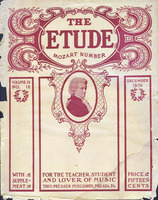BY FRED S. LAW
Mozart’s name has at times been obscured by the many-colored mists of modern realism and romanticism. Signs, however, are not wanting to show that the twentieth century will set the seal of a deeper and broader recognition on his works than has been the case for a long time past. Progress in art, like all progress, moves in spirals; the course of development often seems to take a direction completely opposed to what has already been achieved only to re-enter later on the same curve in a higher plane. A productive period, for instance, is generally followed by one of reproduction; detail and technic abound instead of originality or creative power. The unparalleled development of technical means during the last half-century has had the temporary effect of crowding Mozart’s music into the background, of making it appear slight in structure, and through its comparative facility of execution rather beneath the dignity of conductors and performers. The ear, intoxicated by the pomp and sonority of music-drama and symphonic poem, has grown less sensitive to art couched in unexaggerated terms and true to the eternal laws of form and beauty.
The Mozart Cyclus in Munich.
That Mozart can still attract and charm, even in Wagner strongholds, is shown by the remarkable success of recent revivals of his opera in Germany; the most noteworthy of which has been the Mozart cyclus inaugurated a few years ago by Ernst von Possart, manager of the Royal Opera in Munich. This included, besides such operas as are occasionally heard—“Don Giovanni,” “Marriage of Figaro,” and “The Magic Flute”—several which had practically disappeared from the stage: “Die Entführung aus dem Serail” (“The Elopement from the Seraglio”), “Cosi fan Tutti,” and, if I mistake not, “Idomeneo.” The Wagner cult was at its height, and it seemed a doubtful experiment to take these works down from the shelves where the dust had covered them for many a year and expose them to comparison with the fin de siècle music-drama. It was thought that singers had grown away from Mozart traditions, that the public would find them tame and uninteresting.
“Cosi Fan Tutti.”
The present writer had the good fortune, when in Munich recently, to hear two of this cyclus: “Figaro” and “Cosi fan Tutti.” The former is, of course, reasonably familiar to opera-goers, even in this country. The latter was well described in the libretto prepared for its production in 1897 as a “one-hundred-and-seven-year-old novelty.” It is a comic opera, and contains some of Mozart’s most exquisite music. Its disappearance from the stage has been attributed to the libretto. This is full of the disguise and intrigue which abound in the eighteenth-century comedy and which seem absurd and farcical to the taste of the present day.
The representation was simply delightful. The stage presented a series of charming pictures; the many changes of scene within the two long acts were deftly made without the fall of the curtain by a new and ingenious device: that of a revolving stage on which the various scenes, previously set in their respective compartments, were turned around in a few seconds. The smallness of the auditorium allowed the singers to toss the recitatives—the so-called recitativi secchi—from one to the other with conversational fluency and lightness, and permitted the orchestra to play with the necessary delicacy without appearing thin or too weak. This gave the true Mozart atmosphere an elegance and finish like that of his chamber-music, to which his operas are closely allied in style. This characteristic style is seriously compromised, if not altogether lost, in the exaggerated auditoriums of the present day.
“The Magic Flute.”
One only of the cyclus is given in the large opera-house, “The Magic Flute,” which is conceived on broader lines than Mozart’s other operas. To this Herr von Possart has accordingly given a spectacular treatment eminently adapted to its Eastern mysticism, and which requires a large stage. This setting is described not only as a marvel of stage-craft, but as one which lends a certain meaning and dignity to a libretto which is generally considered as unworthy of the music. In view of this it is surprising, to say the least, to learn that the announcement of the first performance of the opera, September 30, 1791, reads as follows:
“‘The Magic Flute’; drama by EMMANUEL SCHIKANEDER, music by W. A. Mozart, etc.”
The dramatist, Mozart’s shifty friend, is now only known, and that by no means favorably, through his connection with Mozart’s music.
The revival permanent.
These revivals have brought about the curious result that, in Munich at least, the two leading musical influences are Wagner and Mozart. He would have been a bold prophet who, ten years ago, should have ventured to predict such a situation; it almost seems a prefiguring of the millennial lion and the lamb. Both composers draw large and enthusiastic houses at doubled prices: a fact not without significance, since the box-office is a final test as regards popularity. It would still require some boldness to predict their relative position ten or twenty years from now, but it seems safe to assert that the world will never willingly lose such a heritage of beauty as Mozart has left.
Von Bülow said, in one of his classes: “The time is coming, and perhaps soon, when people will rather hear a Mozart sonata in the concert-room than the Liszt ‘Rigoletto Fantaisie,’” and again: “For your musical well-being it is far better to play Mozart than a Hungarian rhapsody.” Brahms, after hearing “The Ring of the Nibelungen,” listened with deep enjoyment to a Mozart sonata and said: “Now we hear some real music.”



